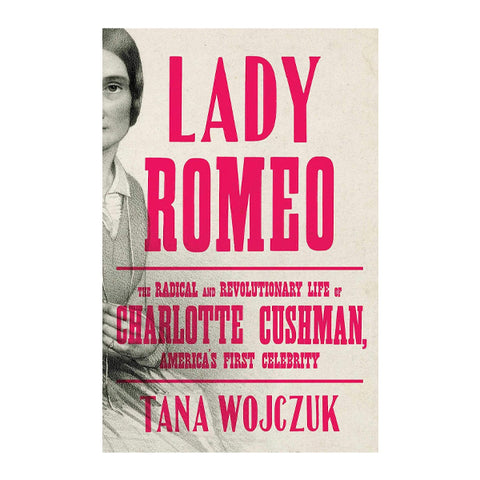As you will read in Lady Romeo, Charlotte Cushman was a woman who earned more than a mere 15 minutes of fame in the 19th century. Raised in Boston at the time of the transcendentalists, a series of disasters cleared the way for her life on the stage—a path she eagerly took, rejecting marriage and creating a life of adventure, playing the role of the hero in and out of the theater as she traveled to New Orleans and New York City, and eventually to London and back to build a successful career. Her Hamlet, Romeo, Lady Macbeth, and Nancy Sykes from Oliver Twist became canon, impressing Louisa May Alcott, who later based a character on her in Jo’s Boys, and Walt Whitman, who raved about “the towering grandeur of her genius” in his columns for the Brooklyn Daily Eagle. She acted alongside Edwin and John Wilkes Booth—supposedly giving the latter a scar on his neck that was later used to identify him as President Lincoln’s assassin—and visited frequently with the Great Emancipator himself, who was a devoted Shakespeare fan and admirer of Cushman’s work. Her wife, Emma Stebbins, immortalized her in the angel at the top of Central Park’s Bethesda Fountain. Cushman was equally radical, making an independent income, supporting her family, creating one of the first bohemian artists’ colonies abroad, and living publicly as a queer woman. And yet, her name has since faded into the shadows.
Now, her story comes to brilliant life with Tana Wojczuk’s Lady Romeo, an exhilarating and enlightening biography of the 19th-century trailblazer. With new research and rarely seen letters and documents, Wojczuk reconstructs the formative years of Cushman’s life, set against the excitement and drama of 1800s New York City and featuring a cast of luminaries and revolutionaries who changed the cultural landscape of America forever.
- 240 pages
- 5.5 x 1 x 8.38 inches
- paperback
- by Tana Wojczuk
The Center for Women’s History new exhibition showcases approximately 45 objects from New-York Historical’s own Museum and Library collections to demonstrate how “women’s work” defies categorization. Curated by the Center for Women’s History curatorial staff and fellows. The Exhibition is on view July 21, 2023 - July 7, 2024.


